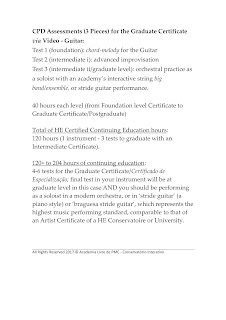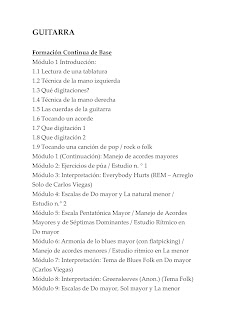Programa de Especialista em Popular Music - Formação Mus OU Educação Mus e Guitarra (com opção de outros Cordofones)
The Continuing Vocational Education and Specialization Course is limited to accept up to 4 applications each year from students and professionals based in Europe and from Portuguese-speaking countries.
Popular Music Graduate Specialization
with Pg professional placement for CPD (PGALPMC-CI)
(previously accredited* Specialization Course for Graduates and acknowledging the ALPMC-CI partnership, at an higher education institution centre)
Now assessed under the officially approved(1) asynchronous tutoring system (video submissions, tutor evaluation and improvement of trainee-performer's profile), developed at ALPMC-CI - a music-specific Research Institution
(*)accreditation obtained by a Continuing Education Centre of the Portuguese Higher Education system, called ES-CEFOC, based at UFP, Porto - renewal of this authorisation is Not mandatory as Specialization degrees and Postgraduate courses are Not controled by the Portuguese Accreditation Agency for Higher Education - the A3ES)
(1) approved at Fundação Universidade Fernando Pessoa, GADI (Dias da Investigação, 2017)
Mandated Course Lecturer - Tutor (course NOW available only through the UFP-GADI approved asynchronous tutoring system, developed at ALPMC-CI)
Carlos Alberto Ferreira Viegas (a voluntary and occasional UFP PostDoc, self-employed Industry PostDoc at CarlosLAB)
SYLLABUSES:
NOTE: syllabuses listed here are only for the continuous assessment and not the final specialization test wich consists of an assessment test after stage 3 level - by submitting an advanced/higher performance video (virtuoso level performance plus an impromptu style application of the diatonic 20-note scale of Carlos Algrace Viegas) and a written project describing the musical approach and techniques used (observational and descriptive research for self-evaluation and specialization test).
Subjects Offered
Classical Guitar for Popular & Jazz Repertoire, Acoustic Guitar, Jazz/Electric Guitar, Cavaquinho, Ukulele, Braguesa Viola or another 10-String Guitar, Rajão from Madeira (Portuguese Isle), Traditional Percussion, Foot Drumming, Carlophone (available soon), Applied Music Theory, Music Research, etc. Skills of Sight-Reading (traditional music notation) and Chart-Reading (chord symbols, rhythm patterns and improvisation), are obligatory.
The 'Learning by Doing' Philosophy
You may study at your own pace by following the appropriate syllabus. The distance tutorial system/method will be the 'Interactive Tutorial and Video System (asynchronous)'. Then you may submit your work for CONTINUING ASSESSMENT at any time.
You will be asked to provide a tutoring evaluation for internal (self-evaluation) quality assurance purposes, and our Practice-video demos are at least of 720p (the minimum acceptable) or higher. You can record the tune/theme parts and solo/impromptu separately but editing the video during a tune part or solo is not allowed for course quality reasons.
Repertoire for the Assessments
Below, in this website page, we present 5 documents with the 4 repertoire lists and some guidance with information on the qualifications requirements. All our Professional Arrangements (Music Manuscripts) come with an Audio File of Ensemble, Orchestra or Solo Playing (as applicable), prepared for you to learn and perform in your assessments and gain a qualification with a nº of accredited continuing education hours. This is available in classic guitar/fado viola or electric/jazz guitar, braguesa viola (10-string guitar), rajão (5-string guitar), cavaquinho/ukulele, foot drumming, carlophone, etc.
GUITAR (English Edition)


GUITARRA - Edição Portuguesa
FORMAÇÃO MUSICAL/TEORIA
GUITARRA (Edición Española)



SOLO BASS (English Edition)
Available soon
BAJO SOLO
Available soon
UKULELE (English Edition)



UKULELE (Edición Española)



ACADEMIA LIVRE DE PERFORMERS DE MÚSICA CONTEMPORÂNEA-CONSERVATÓRIO INTERATIVO
-REPERTÓRIO DO PROGRAMA FORMATIVO-
*****TEMAS À ESCOLHA DOS MEMBROS TITULARES*****
Qualquer tema à escolha do Kingston Irish Tune Book (Slow Session - Ireland and UK) e do Cancioneiro de Musicas Populares (Portugal)
OU temas dos seguintes Sets
Set 1–Música Portuguesa Moderna
1. Barco Negro (Caco Velho)
2. Canção de Embalar (José Afonso)
3. Coimbra (José Galhardo)
4. Canção do Mar (Ferrer Trindade)
5. A Portuguesa (Hino Nacional Português – Alfredo Keil)
6. Verdes Anos (Carlos Paredes)
7. Queremos Deus (Cântico Católico, Macau)
Set 2–Música Clássica
8. Danúbio Azul (Strauss)
9. Marcha Nupcial (Mendelssohn)
10. The Entertainer (Joplin)
11. Marcha Portuguesa (Bomtempo)
12. O Diplomata (John Philip de Sousa)
13. Invenção em Lá menor (Bach) (transposta para Sib)
14. Concerto em Dó menor (Bach)
15. Polka de la Reine (Raff) (versão em ritmo lento)
16. Partita 1 (Bach)
17. Partita 2 (Bach)
18. Partita 3 (Bach)
19. Partita 4 (Bach)
20. Partita 5 (Bach)
21. Partita 6 (Bach)
22. Partita 7 (Bach)
23. Partita 8 (Bach)
24. Partita 9 (Bach)
25. Partita 10 (Bach)
26. Partita 11 (Bach)
27. Partita 12 (Bach)
28. Partita 13 (Bach)
29. Sonata 1 (Bach)
30. Sonata 2 (Bach)
31. Sonata 3 (Bach)
32. Sonata 4 (Bach)
33. Sonata 5 (Bach)
34. Sonata 6 (Bach)
35. Sonata 7 (Bach)
36. Sonata 8 (Bach)
37. Sonata 9 (Bach)
38. Sonata 10 (Bach)
39. Sonata 11 (Bach)
40. Sonata 12 (Bach)
41. Sonata 13 (Bach)
42. Suíte e Cuba (Bach)
43. Fuga em Lá menor (Bach)
44. Fuga em Ré (Bach)
45. Fuga em Sol menor (Bach)
46. Invenção 1 (Bach)
47. Invenção 2 (Bach)
48. Invenção 3 (Bach)
49. Invenção 4 (Bach)
50. Invenção 5 (Bach)
51. Concerto nº1 em Ré menor (Bach)
52. Concerto nº 1 em Dó (Bach)
53. Concerto nº2 em Ré menor (Bach)
54. Concerto nº 2 em Dó (Bach)
55. Quarteto em Dó (Bach)
56. Quinteto em Ré (Bach)
Set 3–Folk e Blues
57. West Coast Blues (Blind Blake)
58. Tema de Blues Folk Maior (Peça para tocar de memória) (Carlos Viegas)
59. Blues-Folk Maior (de memória) (Carlos Viegas)
60. Blues Rhythm (de memória) (baseado em Robert Johnson)
61. Blues Melody & Time for Pickin’ (de memória) (baseado em Robert Johnson)
62. It Coulda Been Worse (Roy Book Binder)
63. Dirty Old Town (Irlandesa)
64. Roddy McCorley (Irlandesa)
65. Minstrel Boy (Irlandesa)
66. Song of the Chanter (Irlandesa)
67. Drops of Brandy
68. Dunkirke
69. Earl Grey
70. The Eddystone Light
71. Eighth of January
72. Eleanor Plunckett
73. Eriskay Love Lilt
74. The Fairy Dance
75. Farewell of Whiskey
76. The Flower of the Quern
77. Fourpence Halfpenny Farthing
78. New York Girls
79. Goodby Dolly Gray
Set 4–Música Popular Portuguesa
(modinhas e lunduns, contradanças, fados)
80. Fado de Coimbra
81. Fado de Cascais
82. Apregoados Clássicos
83. Apregoados Nº2
84. Apregoados Nº3
85. Apregoados Nº4
86. Da Outra Banda do Rio
87. Oh Belem, Oh Belemzinho
88. Bella Aurora
89. Carambolla
90. Fado dos Estudantes
91. Fado Robles
92. Adeus Areal do Rio
93. Arredonda A Saia
94. O Artilheiro
95. Ao Saltar do Barranquinho
96. Aqui Esta’ a Bota
97. A Camponeza
98. Fado Nacional
99. Fado do Sofrimento
100. A Obra do Firmamento
101. D. Agueda de Mexia
102. Fado Corrido
103. Apregoados Clássicos
104. Apregoados Nº2
105. Apregoados Nº3
106. Apregoados Nº4
Set 5–Música Popular Portuguesa
(modinhas e lunduns, contradanças, fados)
107. Da Outra Banda do Rio
108. Oh Belem, Oh Belemzinho
109. Bella Aurora
110. Carambolla
111. Fado dos Estudantes
112. Fado Robles
113. Fado do Celta
114. As Vaccas
115. Cruel Saudade
116. Ela por Ela
117. Estes Moços de Agora
118. Folgadinho
119. Landina
120. Ludum Figueira
121. Marcia Bela
122. Roxo Botão
123. Moqueca
124. O Padresinho
125. Frei Paulino
126. Quando Eu Era Pequenino
127. Ai Que Riso Me Dá
128. A Yayasinha
Set 6–Música Popular Portuguesa e Brasileira
(fados, lunduns, modinhas, contradanças, samba, choro e maxixe)
129. Avè Maria (Ilha de São Miguel)
130. O Ceguinho
131. Fado João de Deus
132. Atraz das Pulgas
133. O António Geraldo
134. Avè Maria
135. A Saudade
136. A Boda dos Pintainhos
137. A Despedida do Marujo
138. Ao Nosso Algarve
139. Sekush Marinyeros
140. Fado Carmona
141. Fado do Gato
142. Que Vale a Nota sem o Carinho da Mulher
143. Quando Come se Lambuza
144. 7 Coroas
145. Baya, Niña
146. Oh Que Bellas Moças
147. Só Ouço Bradar
148. Fado da Severa
149. Fado de Vimioso
150. A Favorita
151. Ano Bom
152. Mil e Uma Trapalhadas
153. A Favela Vai a Baixo
154. Tico Tico no Fubá
155. Sons de Carrilhões
Set 7
Set 8–Jazz (inclui bossa nova)
[para ser tocado de memória]
166. A Garota de Ipanema
167. All Blues
168. All of Me
169. Angel Eyes
170. Blue Bossa
171. Blues for Nina (Joe Pass)
172. Bright Size Life
173. Corcovado
174. Fortune (Frank Gambale, álbum de 2006)
175. Humpty Dumpty
176. Insensatez
177. Minor Swing
178. Oleo
179. Ornithology
180. Road Song
181. So What
182. Straight, No Chaser
183. Summertime
184. Take Five
185. Tune Up; 186. Tenor Madness; 187. Robo Roo (Frank Gambale)
